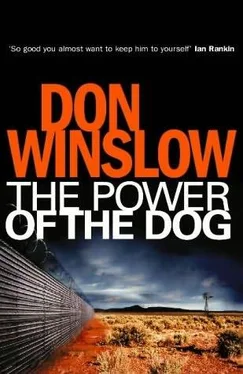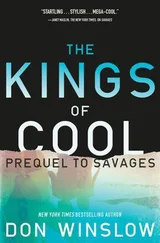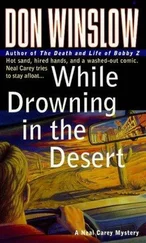Don Winslow - The Power of the Dog
Здесь есть возможность читать онлайн «Don Winslow - The Power of the Dog» весь текст электронной книги совершенно бесплатно (целиком полную версию без сокращений). В некоторых случаях можно слушать аудио, скачать через торрент в формате fb2 и присутствует краткое содержание. Жанр: Триллер, на английском языке. Описание произведения, (предисловие) а так же отзывы посетителей доступны на портале библиотеки ЛибКат.
- Название:The Power of the Dog
- Автор:
- Жанр:
- Год:неизвестен
- ISBN:нет данных
- Рейтинг книги:3 / 5. Голосов: 1
-
Избранное:Добавить в избранное
- Отзывы:
-
Ваша оценка:
- 60
- 1
- 2
- 3
- 4
- 5
The Power of the Dog: краткое содержание, описание и аннотация
Предлагаем к чтению аннотацию, описание, краткое содержание или предисловие (зависит от того, что написал сам автор книги «The Power of the Dog»). Если вы не нашли необходимую информацию о книге — напишите в комментариях, мы постараемся отыскать её.
The Power of the Dog — читать онлайн бесплатно полную книгу (весь текст) целиком
Ниже представлен текст книги, разбитый по страницам. Система сохранения места последней прочитанной страницы, позволяет с удобством читать онлайн бесплатно книгу «The Power of the Dog», без необходимости каждый раз заново искать на чём Вы остановились. Поставьте закладку, и сможете в любой момент перейти на страницу, на которой закончили чтение.
Интервал:
Закладка:
The boyhood days in Badiraguato were idyllic, riding bikes to mountain lakes, diving from quarry rock faces into the deep emerald water of the granite quarries, lazing on the broad porch of the house while a dozen tias-aunties-fussed over them and made them tortillas, and albondigas, and, Adan’s favorite-fresh, homemade flan blanketed with thick caramel.
Adan came to love los campesinos.
They became a large, loving family to him. His mother had been distant since his father’s death, his uncle all business and seriousness. But the campesinos had all the warmth of the summer sun.
It was as his childhood priest, Father Juan, endlessly preached: “Christ is with the poor.”
They work so hard, young Adan observed-in the fields, in the kitchens and the laundry rooms, and they have so many kids, but when the adults come back from work they always seem to have time to hold the children, bounce them on knees, play games and jokes.
Adan loved the summer evenings more than anything, when the families were together and the women cooked and the kids ran around in mad giggling swarms and the men drank cold beer and joked and talked about the crops, the weather, the livestock. Then they all sat down and ate together at large tables under ancient oak trees, and it got quiet as people first settled into the serious business of eating. Then, as hunger faded, the chatter started again-the jokes, the familiar teasing, the laughter. After the meal, as the long summer day eased into night and the air cooled, Adan would sit down as close as he could get to the empty chairs that would be filled when the men came back with their guitars. Then he sat literally at the feet of the men as they sang the tambora, listened rapt as they sang of the gomeros and bandidos and revolucionarios, the Sinaloan heroes who made up the legends of his boyhood.
And after a while the men tired, and talked about how the sun would be up early, and the tias shooed Adan and Raul back to the hacienda, where they slept on cots on the screened-in balcony, on the sheets the tias had sprinkled with cool water.
And on most nights, the abuelas-the old women, the grandmothers-would tell them stories of the brujas-witches-stories of ghosts and spirits that took the forms of owls, of hawks and eagles, snakes, lizards, foxes and wolves. Stories of naIve men enchanted by amor brujo-bewitchment-crazed, obsessive love, and how the men fought battles with pumas and wolves, with giants and ghosts, all for the love of beautiful young women, only to find out too late that their beloved was really a hideous old hag, or an owl, or a fox.
Adan fell asleep to these stories and slept like the dead until the sun struck him in the eyes and the whole long, wonderful summer day started again with the smell of fresh tortillas, machaca, chorizo, and fat, sweet oranges.
Now the morning smells of ash and poison.
Soldiers are storming through the village, lighting thatched roofs on fire and smashing adobe walls with their rifle butts.
Federale Lieutenant Navarres is in a very bad mood. The American DEA agents are unhappy-they are tired of busting the “little guys”; they want to go up the chain and they’re giving him a hard time about it, implying that he knows where the “big guys” are and that he’s deliberately leading them away.
They’ve captured a lot of small-fry, but not the big fish. Now they want Garcia Abrego, Chalino Guzman, aka El Verde, Jaime Herrera and Rafael Caro, all of whom have so far slipped the net.
Mostly they want Don Pedro.
El Patron.
“We’re not on a 'search-and-avoid’ mission here, are we?” one of the DEA men in his blue baseball cap actually asked him. It made Navarres furious, this endless Yanqui slander that every Mexican cop takes la mordida, the bribe, or, as the Americans say, is “on the arm.”
So Navarres is angry, and humiliated, and that makes a proud man a dangerous man.
Then he sees Adan.
One look at the designer jeans and Nike running shoes tells the lieutenant that the short young man, with his city haircut and his fancy clothes, is no campesino. He looks exactly like some mid-level young gomero punk from Culiacan.
The lieutenant strides over and looks down at Adan.
“I am Lieutenant Navarres,” the officer says, “of the Municipal Judicial Federal Police. Where is Don Pedro Aviles?”
“I don’t know anything about that,” Adan says, trying to keep his voice from shaking. “I’m a college student.”
Navarres smirks. “What do you study?”
“Business,” Adan answers. “Accounting.”
“An accountant,” Navarres is saying. “And what do you count? Kilos?”
“No,” Adan says.
“You just happen to be here.”
“My brother and I came up for a party,” Adan says. “Look, this is all a mistake. If you will talk to my uncle, he will-”
Navarres draws his pistol and backhands Adan across the face. The federales toss the unconscious Adan and the campesino who hid him into the back of a truck and drive away.
This time Adan wakes to darkness.
He realizes that it’s not night, but that a black hood is tied over his head. It’s hard to breathe and he starts to panic. His hands are tied tightly behind his back and he can hear sounds-motors running, helicopter rotors. We must be at some kind of base, Adan thinks. Then he hears something worse-a man’s moans, the solid thunks of rubber and the sharp crack of metal on flesh and bone. He can smell the man’s piss, his shit, his blood, and he can smell the disgusting stink of his own fear.
He hears Navarres’s smooth, aristocratic voice say, “Tell me where Don Pedro is.”
Navarres looks down at the peasant, a sweating, bleeding, quivering mess curled up on the tent floor, lying between the feet of two large federale troopers, one holding a length of heavy rubber hose, the other clutching a short iron rod. The DEA men are sitting outside, waiting for him to produce. They just want their information; they don’t want to know the process that produces it.
The Americans, Navarres thinks, do not like to see how sausages are made.
He nods to one of his federales.
Adan hears the whoosh of the rubber hose and a scream.
“Stop beating him!” Adan yells.
“Ah, you’ve joined us,” Navarres says to Adan. He stoops over, and Adan can smell his breath. It smells like mint. “So you tell me, where is Don Pedro?”
The campesino yells, “Don’t tell them!”
“Break his leg,” Navarres says.
A terrible sound as the federale smashes the bar down on the campesino’s shin.
Like an ax on wood.
Then screaming.
Adan can hear the man moaning, choking, puking, praying but saying nothing.
“Now I believe,” Navarres says, “that he doesn’t know.”
Adan feels the comandante coming close. Can smell the coffee and tobacco on the man’s breath as the federale says, “But I believe you do.”
The hood is jerked from Adan’s head, and before he can see anything, it’s replaced with a tight blindfold. Then he feels his chair being tipped backward so that he’s almost upside down, his feet at a forty-five-degree angle toward the ceiling.
“Where is Don Pedro?”
“I don’t know.”
He doesn’t. That’s the problem. Adan has no idea where Don Pedro is, although he profoundly wishes that he did. And he’s confronted with a harsh truth-if he did know, he would tell. I am not as tough as the campesino, he thinks, not as brave, not as loyal. Before I let them break my leg, before I heard that awful sound on my bones, felt that unimaginable pain, I would tell them anything.
But he doesn’t know, so he says, “Honestly. I have no idea… I am not a gomero-”
“Hm-mmm.”
This little hum of incredulity from Navarres.
Читать дальшеИнтервал:
Закладка:
Похожие книги на «The Power of the Dog»
Представляем Вашему вниманию похожие книги на «The Power of the Dog» списком для выбора. Мы отобрали схожую по названию и смыслу литературу в надежде предоставить читателям больше вариантов отыскать новые, интересные, ещё непрочитанные произведения.
Обсуждение, отзывы о книге «The Power of the Dog» и просто собственные мнения читателей. Оставьте ваши комментарии, напишите, что Вы думаете о произведении, его смысле или главных героях. Укажите что конкретно понравилось, а что нет, и почему Вы так считаете.












